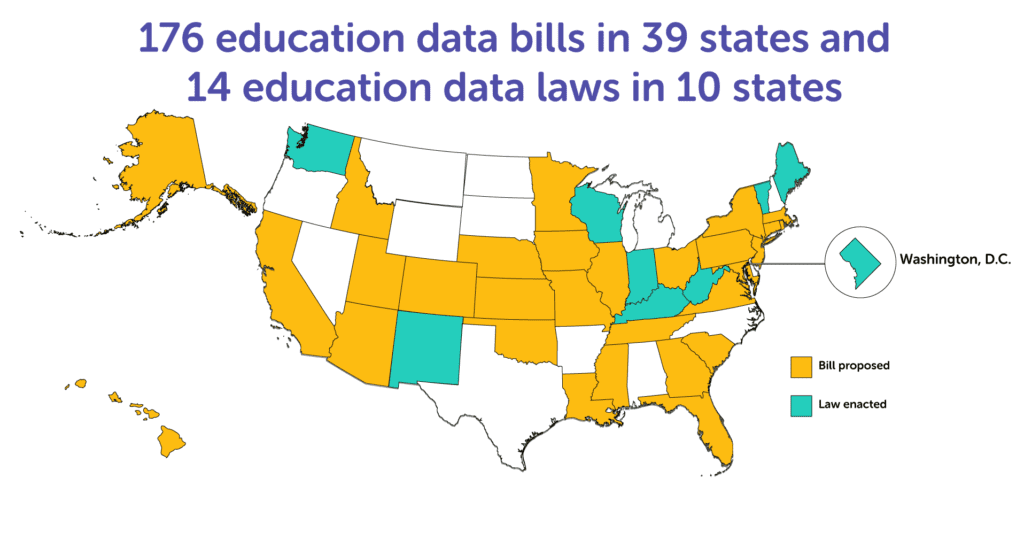The coronavirus pandemic has transformed state legislating across the country. State leaders are working to address the immediate economic fallout of this crisis, including its impact on public education, while determining how or if to continue operating at a time when they cannot convene in person. Legislators will be focused on the pandemic and its ripple effects for the foreseeable future, and most pending policy priorities will have to wait.
Data will have a role to play as state policymakers determine how to support schools and communities moving forward. Much of this work may build on states’ foundational efforts to use data in service of learning. Before their attention turned to the public health crisis, legislators in most states were considering bills that would govern the ways data would be used to support a diverse list of education policy priorities. In 2020, several states have already enacted new education data laws and nearly every state that convened this year considered proposals to improve the use of data to meet their education goals.

Here are some key themes that have emerged from the 2020 session, based on our tracking from January to March. So far, state legislative efforts are geared towards:
- Defining which measures matter for accountability and policy change. Half of all of the education data bills are focused, in some way, on measurement. State policymakers are considering bills that would influence which measures would be included in school accountability and teacher evaluation systems and what data they need to answer their questions about the state of education in their states.
- A new law in Kentucky would require the state’s Department of Education to produce an annual report that includes disaggregated data on participation in computer science classes as part of a state effort to increase representation in this area.
- Protecting student data privacy. As in years past, states are considering bills that govern the role of state and local activities, and bills that limit the activities of school service providers. Though many states have enacted privacy laws since 2014, the work of protecting student data privacy is never done. State legislators are still considering policies that establish processes and restrictions around who can access student data and how they can use it.
- Seven privacy bills contain language modeled off of California’s 2014 Student Online Personal Information Protection Act. These efforts include a new privacy law in Vermont, which restricts the activities of online educational operators, including prohibiting using using student data for targeted advertising.
- Making data work for vulnerable students. Twenty-six bills would improve the use of data to support specific groups of students, especially those who face education instability. Some of these bills govern the transfer of and access to student records, so that those who support students have the information they need. Others would require collecting or analyzing data to shine a light on the experience of vulnerable student populations to help identify where supports are needed.
- A Massachusetts bill would require the state’s Department of Education to create an electronic “backpack” that contains the educational records of youth in foster care.
- Illuminating school to workforce pathways. As states face pressure to improve the skills gap, they are considering measures to improve the availability and transparency of pathways data as a strategy for strengthening the school to workforce pipeline.
- West Virginia’s governor has signed the “Right to Know Act” which would require the state Department of Education to report certain data about postsecondary and career opportunities and outcomes to high schools and the public by October 15 each year. Six other states are considering similar bills.
- Supporting local data use. Some states are considering bills that would create supports for those closest to students to use data, such as creating data tools and supporting educator data literacy. This is an important way states can use their role to make data use possible in schools and classrooms.
- The “Blueprint for Maryland’s Future” would require teacher preparation programs to include instruction on “methods and training on the routine evaluation and use of research and data to improve student performance.”
- A new Utah law would appropriate funds to support a pilot of a user-friendly early warning system data tool for districts.
It remains to be seen how the pandemic and economic outlook will affect future education data policy action, but it’s clear that it is more important than ever to ensure that people have the information they need to support students.
This blog post is also available as a story on Medium.

